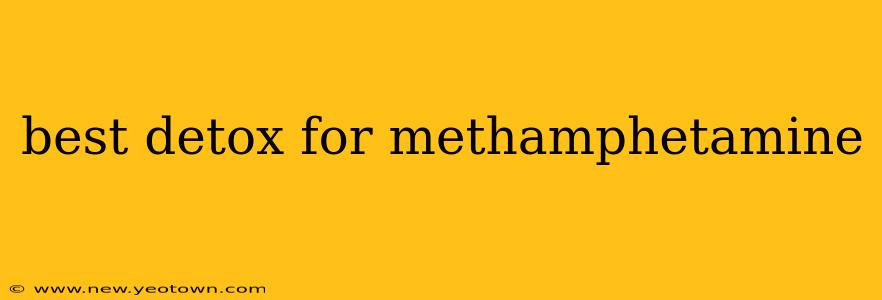The Best Detox for Methamphetamine: A Journey to Recovery
Methamphetamine addiction is a serious health concern, demanding a multifaceted approach to recovery. There's no single "best" detox, as the ideal path depends heavily on individual circumstances, the severity of the addiction, and the availability of resources. However, understanding the process and available options is crucial for anyone seeking help. This isn't a simple matter of a quick fix; it's a journey that requires commitment, support, and professional guidance.
This journey begins with acknowledging the need for help. It's a brave first step, often the hardest, but one that sets the stage for lasting recovery. The path ahead involves detoxification, followed by ongoing treatment and support to prevent relapse.
What is Methamphetamine Detox?
Methamphetamine detox is the medically supervised process of removing the drug from your body. This isn't just about stopping use; it's about managing the severe withdrawal symptoms that can be incredibly dangerous and even life-threatening. These symptoms can include:
- Intense cravings: An overwhelming urge to use methamphetamine again.
- Extreme fatigue: Debilitating tiredness and lack of energy.
- Depression and anxiety: Significant mood swings, feelings of hopelessness, and intense anxiety.
- Insomnia: Difficulty sleeping or staying asleep.
- Irritability and aggression: Increased anger, frustration, and difficulty controlling emotions.
- Psychosis: Loss of contact with reality, hallucinations, and delusions (more common with long-term heavy use).
It's crucial to undergo detox under medical supervision. Attempting to detox alone can be incredibly dangerous and increase the risk of complications and even death.
How Long Does Methamphetamine Detox Take?
The length of detox varies depending on several factors, including:
- The amount and frequency of methamphetamine use: Heavier users may experience longer and more intense withdrawal.
- The individual's overall health: Pre-existing health conditions can impact the detox process.
- The presence of other substance abuse: Detox for multiple substances requires a more complex approach.
While the acute withdrawal symptoms might subside within a week to 10 days, the cravings and other psychological effects can persist much longer, often requiring weeks or months of ongoing support and treatment.
What are the Different Types of Methamphetamine Detox?
Several methods can be used during methamphetamine detox, often in combination:
- Medical Detox in a Facility: This is often the safest option, offering 24/7 monitoring and medical intervention to manage withdrawal symptoms. Medications may be used to reduce cravings, manage anxiety, and address other withdrawal symptoms.
- Outpatient Detox: This approach involves regular visits to a medical professional for monitoring and medication management but is typically only suitable for individuals with less severe addictions.
- Residential Detox: This involves staying at a residential facility during the detox process, providing a structured environment with support and monitoring.
What Medications are Used During Methamphetamine Detox?
There's no single medication specifically designed to treat methamphetamine withdrawal. Instead, medications may be used to manage specific symptoms such as:
- Antidepressants: To help with depression and mood swings.
- Anxiolytics: To manage anxiety and agitation.
- Sleep aids: To address insomnia.
The choice of medication will depend on the individual's needs and the severity of their symptoms.
What Happens After Methamphetamine Detox?
Detox is just the first step. Successful long-term recovery requires ongoing treatment, such as:
- Therapy: Individual, group, or family therapy can help address the underlying causes of addiction and develop coping mechanisms.
- Support groups: Groups like Narcotics Anonymous provide peer support and a sense of community.
- Medication-assisted treatment (MAT): In some cases, medications may be used to help prevent relapse.
Recovery from methamphetamine addiction is a challenging but achievable journey. Seeking professional help is vital for navigating this process safely and effectively. Don't hesitate to reach out to a healthcare provider, addiction specialist, or a local treatment center. Your health and well-being are worth it.

